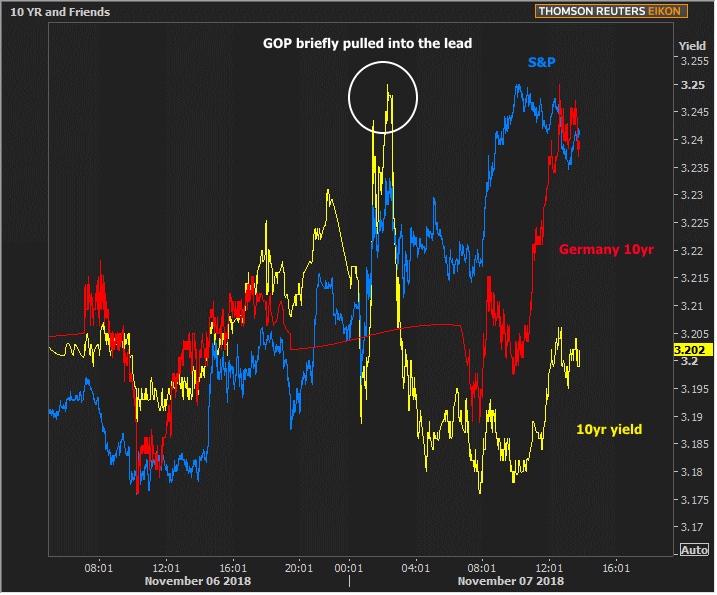Whether you thought the election would or would not matter for the bond market, you were right! At times, it mattered quite a bit in the overnight session, but as we begin the day, trading levels are arguably close enough to yesterday's that no one needs to shout from the rooftops about imminent sea-changes.
Refreshingly, the election had exactly the impact we suspected in terms of the correlation between democrats taking the House and lower rates. That's not because democrats have anything more to do with rates than republicans. Rather, it's been unchecked government spending (or specifically, revenue shortfall from the tax bill) that has pushed rates higher due to increased Treasury issuance, and indirectly via a hotter running economy due to the stimulative effects of the fiscal policies. A democratic House (combined with a republican senate) means it's that much harder for the government to spend more money.
Markets seemed to understand this in the overnight session, as discussed in this late night update. Here's the chart from that update. Long story short, when the republicans' chances of victory in the house briefly crested 50%, rates spiked to their highest levels of the night. Not a moment after democrats moved back into the lead, rates began to fall.


So what does this mean for the rest of the day? Unfortunately, it may simply mean that bonds didn't sell-off to new high yields. Democratic control of the house can't unwind the tax bill or the revenue shortfall (and increased Treasury issuance) created by policies that are already in place. Those headwinds will continue to pose problems for rates, in addition to plain old economic strength and the threat that inflation may eventually show up.
In terms of economic data, today is another dud. Sure, there are a few third tier reports, but they're far from market movers. Our best bet for calendar-related volatility is in the hour or two following the 30yr Bond auction at 1pm. The auction itself may not be a big market mover, but Treasury traders will have to turn their cards face up for the week after that, and sort out who needs what (and how badly they need it).
This process of redistribution following a Treasury auction can often cause a bit of volatility, but it's perhaps even more common for nothing at all to happen. In the bigger picture, I think the bigger threat and the bigger reason to avoid bigger moves is the prospect for wage growth to translate to an uptick in inflation. To that end, we get inflation data at the end of this week, but we'll also probably get some tune-out on the part of traders ahead of a 3-day weekend. With that in mind, next Wednesday's CPI data is looking more and more interesting when it comes to casting votes on the next major dose of bond market momentum.





